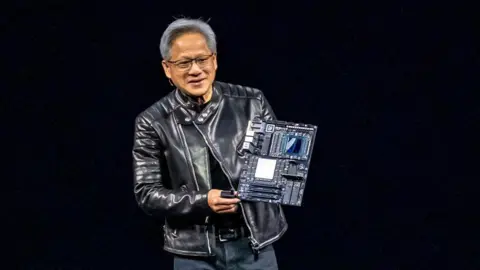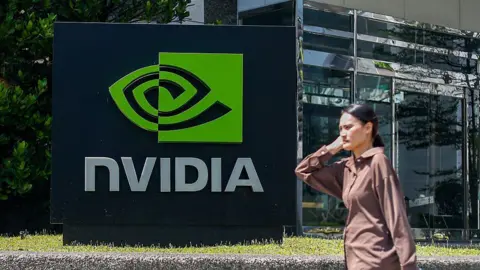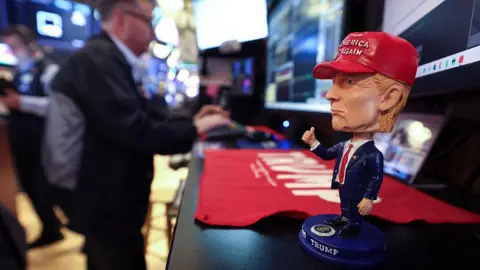 Getty Images
Getty ImagesComputer chip giant Nvidia has once again found itself at the centre of US-China tensions over trade and technology.
On Thursday Nvidia’s chief executive Jensen Huang flew to Beijing to meet senior Chinese officials, just after the US imposed new export controls on its chips.
The California-based company will require licenses to export its H20 AI chip to China, a move which the US Commerce Department said was designed to safeguard “national and economic security”. Nvidia said federal officials had told them the requirement will be in force for the “indefinite future”.
But why is the company so pivotal in the race for AI supremacy between the US and China?
What is Nvidia?
Nvidia designs advanced chips, or semiconductors, that are used in generative artificial intelligence. Generative AI can produce new content from a user’s prompt, like ChatGPT.
In recent years, a surge in global demand for AI chips led Nvidia to become one of the world’s most valuable companies. In November, Nvidia briefly unseated Apple as the largest company in the world by market capitalisation.
Because its chips are seen as so essential to advancements in generative AI, successive US administrations have scrutinised Nvidia’s relationship with China.
Washington hopes the new export controls will slow China’s development of advanced AI chips – especially their use by the Chinese military – and secure an advantage in AI competition with Beijing.
Why is Trump targeting Nvidia’s H20 chips?
US restrictions on Nvidia selling chips to China are not new.
In 2022, the Joe Biden administration imposed separate export controls on the sale of advanced semiconductors to China. Nvidia specifically designed the H20 chip to comply with those existing restrictions.
A more powerful Nvidia chip, the H100, was already banned for sale in China.
However, the recent emergence of DeepSeek, a Chinese generative AI company, has prompted fresh concerns in the US that even less powerful chips could lead to significant technological breakthroughs.
DeepSeek claimed it could operate as effectively as other applications like ChatGPT using less advanced chips.
Now, there is increasing demand for Nvidia’s H20 chips among Chinese technology companies such as Tencent, Alibaba, and ByteDance, the parent company of TikTok.
Those companies have outstanding orders for the chips. But because there is no grace period on the imposition of the new curbs, Nvidia expects to be hit by losses of $5.5bn from these orders that it can no longer fulfil.
Chim Lee, a senior analyst at the Economist Intelligence Unit in Beijing, told the BBC that there are alternative AI chips being developed in China, by companies like Huawei.
Although they are currently viewed as inferior to Nvidia’s, Lee said the US curbs could prompt China to focus on developing better chips.
“It will introduce challenges to China’s AI scene, but it won’t massively slow down China’s AI development and deployment,” Lee added.
 Getty Images
Getty ImagesWhy is Nvidia’s CEO in China?
China is a critical market for Nvidia. The world’s second-largest economy accounted for 13% of its total sales last year, though that is still far less than the United States, which accounted for nearly half.
The timing of Mr Huang’s trip is being seen as an effort to shore up Nvidia’s business in China despite the latest curbs.
In his Beijing meeting with Ren Hongbin, head of the China Council for the Promotion of International Trade, Jensen Huang said he hoped “to continue to cooperate with China”, according to state broadcaster CCTV.
On Thursday, the Financial Times reported that Huang’s trip to China also included a meeting with DeepSeek’s founder, Liang Wenfeng.
Separately, top Chinese official He Lifeng told Huang that “China’s market investment and consumption potential is huge”, according to state news agency Xinhua.
How will the export controls impact US-China competition?
 Getty Images
Getty ImagesThe controls are part of Washington’s broader goal to de-risk supply chains for advanced technology away from China, and bring more semiconductor production back to the US.
Nvidia this week announced plans to build up AI servers in the US worth up to $500bn. US president Donald Trump later claimed his re-election drove Nvidia’s decision.
And in March, Taiwanese semiconductor giant TSMC, which manufactures Nvidia’s chips, announced it would invest an additional $100bn in advanced manufacturing facilities in Arizona.
Gary Ng, senior economist at Natixis, told the BBC the latest developments show that global technology is becoming increasingly polarised between “two systems”, one dominated by the US and the other by China.
“Tech will be less global in that sense, and it will be subject to more restrictions.”






